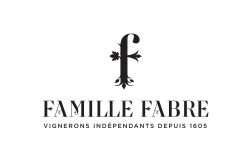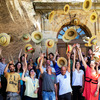Famille Fabre
The Fabre family, winegrowers since 1605, is settled on different Domains in Languedoc, combining the traditions of a very old wine region with the modernity of convivial wines of great finesse.
Château de Luc is one of those magical places where you can meet everything that makes a great wine: a climate, an exceptional terroir, a 4x4 excursion to "La roche trouée" can reveal to you, unless you prefer the charm of a bike ride along the Orbieu river or a few steps in the shade of the holm oak in the park of the Château.
You should also visit the wine-making cellars and the barrel cellar under the medieval vaults. Our history allows us to travel through the centuries while remaining within the castle walls: Roman objects (amphorae, coins, ...), fragments of sarcophagus dating back to the Visigoths whose army was able to enter the city of Narbonne at the height of the grape harvest because "the war can wait, the vine cannot"!
The 17th century wing of the castle is remarkable for the balance of its volumes: a staircase with an echoing wall, a kitchen where time has stopped...and where you are invited to enjoy a convivial moment near the spit and the vegetable garden. The cabinet of curiosity gathers memories of different wine-producing eras: the splendor of the pre-war years, the first measuring devices…
Our goal is to allow you to feel a real emotion: our wines are unique, coming from a climate, a soil, a reasoned technique (QUALENVI specifications: Quality-Environment of the Independent Winegrowers of France), label organic (ECOCERT and NOP).
Our talent as winemakers is that of a craftsman who strives to pass on what nature allows us to offer: a special vintage, for the greatest pleasure of those who will share it.
Philosophy
These are some certifications:
Certified Organic by Ecocert since 1991
Certified HVE level 3. High Environmental Value certification is built around 4 themes: biodiversity, phytosanitary strategy, fertilization management and water resource management.
Wines with low to no added sulfite, limit use of sulphur and copper
Work on water conservation (lack of water in the region, droughts) ; use of water tanks (filled with rain), dripping system
Agro-forestry to bring back diversity in the vineyards and help cope with climate change: trees and bushes help cool the air during summer and warm it during winter.
Birds houses: Bird Protection League offers us birds houses made by an association for the integration of disabled people and we are going to install 30 of them, 10 of each: hoopoe, chickadees and bats.
Also bee hives, insect hotel and snake hotels in the vineyards to protect and improve biodiversity.
Planting of resistant varieties (resistant to drought and diseases, allowing us to also reduce the use of copper and sulphur): Souvigné gris, Sauvignac and Floréal (all white grapes), 2nd year, first harvest this year of 20 hectoliters for a test
Planting mustard and fava beans during autumn/winter to help bring nitrogen to the soils
Biodynamic tea preparations to help strengthen the vines: we use horsetail / wicker tea to energize and stimulate the vines, orange peel to dry out powdery mildew or cryptogamic diseases, sulphur and copper of course in very low doses! Potassium bicarbonate is used to fight against powdery mildew, interesting to reduce the doses of sulphur.
Reusable bottles, we are working with re-usable bottles with a French organic supermarket chain (Biocoop)
Part of the Convention of Companies for Climate www.CEC-impact.org: The Fabre family is working on a roadmap to formalize our initiatives to be part of a strong ecological transition!
Carbon footprint audit with AKTIO to reduce and compensate our emissions and become carbon neutral
Local association sponsoring: we give wine to local associations, pétanque clubs, to organisations renovating buildings around us (the chapel of Gasparets)
Biography
Coming from a family of winegrowers for 15th generations, Louis Fabre took over the family vineyards spread over three main terroirs, in the heart of the Corbières, Minervois and in the plain of Béziers. Passionate and convinced very early on by the quality of his terroirs, he began to produce its own wines in the 1980s. An agricultural engineer, he was quickly convinced of the importance of preserving the natural environment of his vineyards and converted the entire vineyard to organic in 1991.
Today, the family remains convinced of the necessity to work with a preserved nature. We are multiplying initiatives to promote biodiversity and the development of our vineyard. In 2022, the Fabre family will represent the wine industry at the Convention of Companies for Climate (CEC-impact.org). Our objective is to rethink the economic model of our business in depth, to achieve a roadmap to reach several goals including carbon neutrality. In this context, we have launched our carbon audit this year, with the ambition of becoming a mission-driven company and getting BCorp certified.
With a contagious passion, Louis Fabre passes the torch to his daughter Clémence.
She arrived at the estate in 2015, and is working on the brand identity of the domain. With 8 years of professional experience in Asia as Sopexa project manager and sales manager with the importer Altaya Hong Kong, she is in charge of promoting our wines on export markets.
Louis-Jacques, her husband, after having managed a chain of wine bars in Paris, Hong Kong and Singapore, joined the company to develop sales in France, which today represent more than 700,000 bottles sold in the independent retail network.
Contact Us









